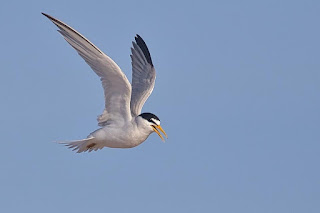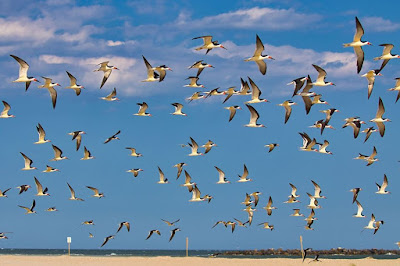We are hopeful that this blog is finding you and yours healthy and following the guidance that has been communicated by the Center for Disease Control (CDC) at this time of national concern of the spread of the coronavirus (COVID 19).
We had been looking forward to being on the beach with many of you and had already begun plans for another fun nesting season on Wrightsville Beach, however, the National Audubon Society suspended all volunteer activities for the safety of our volunteers as individuals and as a community.
The Executive Director for Audubon NC and Vice President for the National Audubon Society, Andrew Hutson, shared with the Wrightsville Beach Birds Stewards…
“Our beach stewards are the first line of defense for our shorebirds and seabirds, which face an uncertain future. So, we’re disappointed – to say the least – to have to curtail our activities this season. However, we want to ensure that our incredible volunteers remain healthy so that we can continue to protect our birds in the months and years ahead.”
As of March 20, the Town of Wrightsville Beach closed the beach strand to the public (residents and visitors). The Town has been slowly opening access and activities on the beach and we encourage everyone to follow the Town’s order. See here for Town information: https://www.townofwrightsvillebeach.com
We are grateful that The Town of Wrightsville Beach allowed Audubon staff to post the south end nesting site on Sunday, March 22 while the beach was closed to the public. We are very appreciative of the town’s support. Audubon staff also posted Lea-Hutaff Island and our other Cape Fear region sanctuaries.
We encourage everyone to follow all guidance from health officials and refer to reliable sources, including North Carolina’s Department of Health and Human Services (https://www.ncdhhs.gov/covid19) and your county’s health department.
APRIL 17, 2020
These shots were taken from a boat showing there was a lot happening at the South end mid-April as the birds took full advantage of the posted area. (photos by Tom Hanna)
APRIL 21, 2020
Just four days later it was clear that the South End was very busy and several Least Terns were seen already sitting on eggs! (photos by Tom Hanna)
MAY 03, 2020
NESTING ACTIVITY ON THE SOUTH END OF WRIGHTSVILLE BEACH
Our Coastal Biologist for Audubon NC, Lindsay Addison, did a nest check recently so we have results to share with you.
We counted 278 Black Skimmers on the beach resting and beginning courtship. We did not see any fish presentations or mating yet, but we expect that activity to begin this week.
 |
photo showing large colony of Least Terns at South End
(taken through scope by Marlene Eader) |
Hundreds of Least Terns are on the south end and many of them are already sitting on nests. Courtship activities are also underway with fish presentations and mating. Our first chicks are anticipated in mid-May.
Lindsay was able to locate two American Oystercatcher nests…scrapes with eggs on the south end. We have an additional pair up by Beach Access #4 also incubating eggs which we posted.
We have several pairs of Common Terns beginning courtship and fish presentations and mating. Lindsay saw 4 pairs.
May 10, 2020
Our first Least Tern chick was spotted and photographed by Tom Hanna on Mother’s Day, Sunday, May 10. How appropriate is that!!
(photos by Tom Hanna)
 |
| We know the chick is not stressed when the chick is close to or with the parent! |
May 16, 2020
An update on the nesting activity from Lindsay Addison’s check on the Wrightsville Beach south end nesting colony on Wednesday, May 13, 2020.
AMERICAN OYSTERCATCHERS
One of the two American Oystercatcher nests hatched Thursday afternoon!!
On Thursday (5/14) around 4 PM and an eggshell was found by the water’s edge. Thinking it could be an Oystercatcher egg, our first reaction was concern that it had been eaten by a predator. The following two pictures were sent to Lindsay and she informed us that it was a hatched Oystercatcher egg!!!
 |
| photo by Marlene Eader |
 |
| photo by Marlene Eader |
Oystercatchers remove the eggshells from their nests after hatching. One of the pair will fly with the eggshell and drop it by the water…an excellent “housekeeping” practice to eliminate the attraction to fire ants.
Lindsay went to the colony that evening and took this sweet picture of the two newly hatched Oystercatchers with a sibling waiting to hatch!
We saw the Oystercatcher family by the water on Friday, May 15.
LEAST TERNS
Lindsay counted 226 Least Terns nests…incubating or brooding chicks!
226 nests is the largest colony of Least Terns on South Wrightsville for several years.
PLEASE BE EXTRA MINDFUL…If you have the opportunity to go to the beach to see the birds, remember to stay back from the posting. The Least Terns have nested close to the posting and are easily disturbed and will be flying overhead and calling out. Stay back even if you are photographing because if the birds are flying that means that their eggs and/or chicks are exposed and in danger.
I have seen two predators at the South end … Fish Crows and a juvenile Great Black Backed Gull.
COMMON TERNS
Lindsay was able to locate and count eight nests of Common Terns of which one was in the dunes and the other seven are out in front on all sides of the posting. One pair is located on the East side of the posting among the small separate group of Black Skimmers.
Two pairs are on the West side (inlet side) as one approaches the colony from Access 44 and the beach is narrow at this point.
Common Terns are protective of their nests and sometimes aggressive by pooping on people and striking people on the head. The pair on the West side was very persistent in moving beachgoers away even those individuals walking close to the water line.
AGAIN, PLEASE BE MINDFUL AND GIVE THE BIRDS PLENTY OF SPACE IF YOU WALK AROUND THE SOUTH END.
BLACK SKIMMERS
Hundreds of Black Skimmers are on the South End and courtship is well underway. Some nesting has begun and several Skimmers are incubating eggs. We are hopeful for another successful nesting season.
If you go to the beach, the public parking lot across the street from the Oceanic is open and the closest lot to the south end. All restrooms remain closed.

























































